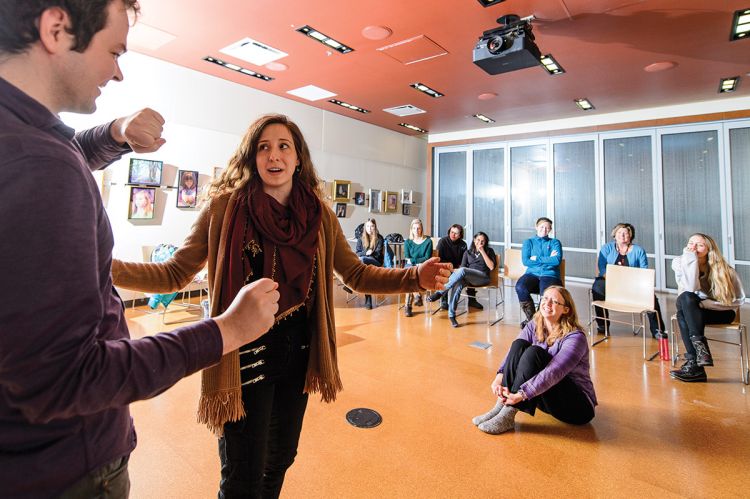Health professionals learn empathy through improv

While most people associate improvisation, or improv, with comedic acting, Amy Zelenski, PhD, assistant professor, General Internal Medicine, also associates improv with a way to teach health professionals how to relate to one another.
The results from her work with medical students and health professionals on the effectiveness of improv were recently published in Academic Medicine.
Dr. Zelenski’s idea to teach health professionals improv came to her during a residency training simulation. She noticed that even though patient care teams are interprofessional, the only people involved in the simulation were residents. Without receiving input from all health professionals involved, patient care can be compromised, and it can lead to members of one health profession “othering” those in another profession.
“Health professionals train in different silos, and often don’t get to actually work together during training, and are expected to work seamlessly in high-intensity, high-stress situations when they get out of training,” Zelenski said.
These issues displayed a need for health professionals to better relate to one another to ensure quality patient care.
“That’s when I realized there may be more opportunity as they’re growing as professionals to get them to work together and talk about what that process is like, so that when they leave and are practicing together, they have more of a common language,” Dr. Zelenski said.
Dr. Zelenski, a former actor, recognized that improv was a method to teach empathy and help health professionals develop an understanding for each other.
“I thought, ‘what is it about actors that enables them to understand somebody else?’ That’s what drew me to improv, because improv is about affirming another person’s perspective.”
That is when, in fall 2016, she piloted the course, Improvisational Theater for Health Professionals. This 15-hour course consisted of medical students and practicing health professionals.
“The nice thing about improv is that it really flattens the hierarchy. Everybody feels really nervous and weird about it,” Dr. Zelenski said.
In the class, students participated in various improv games, then debriefed the game to discuss how the strategies used in the game connected to a clinical setting. To explore nonverbal communication, one game had two students speak gibberish, and two students be their translators. After watching the scene play out, students talked about how much was communicated through gestures, tones, and facial expressions.
After the course, the students were asked to participate in two questionnaires, and to respond to 19 interview questions.
The researchers, who included Fay Osman, MPH, assistant researcher, Administration, and Vonnie Schoenleber, residency project manager, Administration/Education, synthesized the quantitative and qualitative results into three categories by various aspects of empathy: attunement/perceiving, affirmation/processing, and advancement/responding. The advancement/responding group showed the most statistically significant improvements, with increases in empathetic concern, ease, explain, help, plan, and thinking on your feet/influences in other areas of life.
This shows class participants are more likely to understand and resonate with other members of the care team.
Dr. Zelenski said she was pleased with the class’ great conversation, which, they may not have had elsewhere.
“It’s been very rewarding, and something I’m thankful to see,” Dr. Zelenski said.
Dr. Zelenski is teaching the course via Zoom this fall, and hopes to do more studies like this on a national level, across more institutions.
Banner: Medical professionals and UW students in health care disciplines learn improv techniques so they can tap creativity and spontaneity in stressful moments on the job. Photo Credit: Bryce Richter.